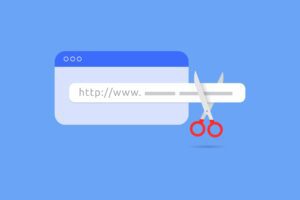URLs are not to be underestimated. Often overlooked, URLs are a component of technical SEO that is an important ranking factor. Out of the endless resources that exist on the internet, your site’s URL makes sure a user finds you.
To put it simply, a URL tells a browser where you want to go, so search engines can locate and index your site much easier with an optimised URL.
Titles and headings are often prioritised – while still important, they shouldn’t lead you astray from paying attention to URLs in your SEO efforts
URLs are part of structuring a site, and if a site’s structure is not optimised to its fullest, a drop in rankings is inevitable. No company wants this, so we’re here to help with our full guide to URLs for SEO.
The importance of URLs for SEO

Why are URLs important for SEO practices?
For appropriate indexing from the ‘crawlers’ (search engine bots), a URL needs the correct format so it can be correctly identified. A URL can also provide context for a user, confirming that what they’re about to click on will satisfy their needs.
Both the journeys taken by the user and the search bots are made much easier by an optimised URL. Those two journeys should be at the heart of your URL creation process, creating a link that specifies what the content of the page really is about.
Your site is likely to be indexed more quickly when specifically describing its contents in the URL. Generic URLs can get lost among all the endless URLs on the internet.
Accuracy is key, and making your URL as understandable as possible can help to achieve the aim of SEO – an increase in traffic by ranking highly in the SERPs.
Static vs dynamic URLs
Knowing the difference between static and dynamic URLs helps you navigate your SEO practice. Static URLs are widely considered to be the best option for SEO. But why?
| Static URLs | Dynamic URLs |
| Permanent – A search bot will find your site much easier to crawl and index. Usually, the content of the web page and URL remains the same and these URLs are simple to form. | Not permanent – their dynamic nature is in their name. Based on what a user is looking for, the web address will change. While dynamic URLs can be useful for e-commerce SEO by providing a URL for the user’s desired product, static URLs are still favoured. |
Static URLs have the advantage of permanence. A search bot will find your site much easier to crawl and index. Usually, the content of the web page and URL remains the same and these URLs are simple to form.
Dynamic URLs run the risk of duplicate content. Their reliance on whatever the user ‘types’ into the search engine limits the chances of search bots locating and indexing the URL. The constant change can cause problems for your SEO strategy.
Adding keywords may also be a challenge for dynamic URLs. There are limits placed on how you can strategically place keywords, since the URL is now generated with information from a database
Essentially, a dynamic URL is concerned with delivering the right content to the user. While this seems like an advantage for the user experience, it may not highlight what the page is about or display the keywords in an easily located position.
A static URL avoids these issues. It is the safest bet for getting your site correctly indexed by search bots, as continual shifts in the URL don’t have to be picked up on.
Top tips
Hopefully you now recognise how creating an optimised URL will benefit your SEO practices. Below we’ve provided you with our tips to create a URLs for SEO that will be sure to boost your rankings.
Keywords

We asked our Technical SEO, Adam Chapman, if adding keywords to URLs matters:
Absolutely. Any clear signal you can send to search engines of what the page is about will help.
If a URL is a string of random words or numbers, like this: /page121/url/ then it provides no clear information to search engines like Google what the page is about. A good URL should include target search terms.
Adding the keywords to your URL is beneficial for both user intent and ranking accurately within the SERPs. Users and bots can recognise how relevant your page is for what’s been typed into the search bar.
Putting the keywords at the start of the URL and not just the title allows another way for you to make your mark in the SERPs.
Concise and clear

A concise, clear URL maintains relevance and recognisability. Industry-specific keywords relating to separate pages on your site can be added to the end of the URL to broaden the range of topics your site can be identified for.
Again, the user experience should be in mind, and no one wants to read a wishy-washy URL that doesn’t directly specify what its page is talking about. If it’s unclear, a user won’t give it the time of day and will likely turn to a different site for answers instead.
Pick your characters wisely
We also asked Adam about whether picking certain characters for your URL is important:
Yes. Certain characters will make a URL invalid. These include: {“, “}”, “|”, “\”, “^”, “~”, “[“, “]”, and “`”.
Additionally, even though URLs aren’t case sensitive, it’s best practice to use lower case characters. Adding capitals just adds no value- its only difference is making your URL look less attractive to a user and ruining the consistency of the link structure.
Create a secure URL
Using HTTPS is a more secure practice, and google favours URLs that are secure. With internet safety at the forefront of user’s minds, the warnings given to pages that aren’t secure is enough to drive users away from your site. The last thing you want is users being warned away from engaging.
Beginning your URL with HTTPS instead of HTTP adds a layer of security that means any information transferred between the server and browser is encrypted. Again, this is reassuring for users and the search engines, so your site is likely to rank higher with HTTPS.
How we can help optimise your URLs for SEO
At Embryo, our SEO team is dedicated to providing bespoke strategies that suit your needs and tailor to your industry. Our technical SEO service can target the world of URLs, which is often overlooked. We understand the importance of a good, solid URL structure and our holistic approach means we never overlook any aspect of the SEO process.
Want to read more about SEO in general? Have a browse at our range of blogs written by our team of experts. We’d love to hear from you if you have any further questions.
FAQs
Answered by Amy Leach
Does WordPress flag/allow duplicate URLs on my website?
This completely depends on your WordPress set up most of the time if you publish two pages with the same URL the most up-to-date version well then overwrite the previous version.
What is the difference between a URL and https?
HTTPS is used to show the security of websites to show data is secure. Is the full path of a website including the domain name, folder structures and page names.
Can there be different versions of the same URL?
You can have different versions of the same URL by using URL parameters such as the search functionality of filters on e-commerce websites. That being said we would not recommend that these are indexed by Google and would often be blocked for crawlers to read otherwise you could end up with serious capitalisation on site if not handled correctly.
Do I create my URLs through WordPress?
Yes, as each page is set up on WordPress you can specify that URL in which you want this to live on.












